Today I am reviewing another great alto saxophone mouthpiece made by Phil Engleman at Phil-Tone mouthpieces. I have reviewed quite a few Phil-Tone sax mouthpieces on the site already and am always interested when Phil announces a new Phil-Tone saxophone mouthpiece model.
A couple of months ago he announced that he had a new mouthpiece model called the Orion model that was based off of the old Brilhart Tonalin alto saxophone mouthpieces. I don’t think I have ever played a Brilhart saxophone mouthpiece on the alto sax so I was not sure what to expect from the new Phil-tone Orion model of alto sax mouthpiece.
Phil-Tone Orion .076 Alto Saxophone Mouthpiece
Here’s a quote from Phil about the new Orion alto sax mouthpiece from his website:
The Orion alto sax mouthpiece is a professional piece at an intermediate price. It achieves what no other mouthpiece can. Handmade precision and play tested adjustments for a price point of machine made pieces. The Orion is based on the old Brilly pieces…think Charlie Parker. It has the same chamber but with the response and accuracy you would expect from Phil-Tone. -Phil Engleman
Charlie Parker with his Brilhart Alto Saxophone Mouthpiece
The Phil-Tone Orion alto saxophone mouthpiece I received to review is made of resin. The look and feel of the outside of the mouthpiece resembles hard rubber in my opinion. I actually wasn’t sure if it was hard rubber or resin and had to email Phil to ask him what it was made of. The clue for me that it was perhaps resin, was that the inside bore of the mouthpiece was super shiny. I have never seen a hard rubber mouthpiece with a chamber and bore that shiny before so guessed that it was a resin material. Phil confirmed this for me via email.
The exterior of the Orion alto sax mouthpiece is pretty plain looking. There is no engraving on it except “Phil-Tone” hand engraved on the top of the body of the mouthpiece. The mouthpiece is a .076 tip opening or around a 6 tip opening.
Phil-Tone Orion Alto Saxophone Mouthpiece
The mouthpiece tip rail is very close in shape to all of my alto sax reeds and the table and rails look even and well made as they are on all of the Phil-Tone mouthpieces. The baffle has a nice medium rollover to it and then the baffle heads down at a curve into the chamber area. After the baffle rolls over, the descending slope of the baffle looks to have a side to side curve to it where the outside edges are a little higher than the center. The sidewalls are straight and look to angle inward slightly as they approach the chamber area.
Phil-Tone Orion Alto Saxophone Mouthpiece
The Phil-Tone Orion alto saxophone mouthpiece has a unique shaped chamber that I am told is the same as the old Brilhart Tonalin alto saxophone mouthpiece chambers. The straight sidewalls give the chamber sides a straight edge and the bottom of the chamber looks slightly lower and wider than the top of the chamber. Like I mentioned above, the inside of the chamber and bore are incredibly shiny and smooth looking.
Phil-Tone Orion Alto Saxophone Mouthpiece
The Phil-Tone Orion alto saxophone mouthpiece played incredibly well with every reed I tried on it. It was very reed friendly! I ended up recording with a Lupifaro Evo 3 reed that Lupifaro sent me to try out but my Rigotti Gold and Boston Sax Shop alto sax reeds played equally as well on it.
Phil-Tone Orion Alto Saxophone Mouthpiece
The .076 tip opening felt very comfortable for me and the mouthpiece had a clear, pure and focused tone to it that I would classify as medium bright.
At the beginning of the sound clip I start with a little of “There is No Greater Love”. The Orion has a a nice crisp bop sound to it that really sings in the upper register. The tone sounds light and beautiful to me.
I then go into my usual “The Summer Knows” melody that I have been playing on all of my recent alto saxophone mouthpiece reviews. I love this melody and I especially love how it sounds with the Orion alto mouthpiece! (Also, check out the clip with a little bit of reverb added which is the second sound clip.)
I have been playing many of the same melodies and lines on my reviews lately so that listeners can more easily compare the sound clips and hear how the same lines and melodies compare to each other from mouthpiece to mouthpiece.
Phil-Tone Orion Alto Saxophone Mouthpiece
The Phil-Tone Orion’s chamber and straight sidewalls seems to give it a crisp focus of tone. That crisp focus also makes it fun to play straight ahead lines because the crisp brightness of the tone seems to make the jazz articulation and accents “pop” a bit more in my opinion.
The Orion alto sax mouthpiece played smoothly and evenly throughout the range of the horn and the intonation was excellent. The articulation was clean and efficient also.
I would say the Orion would rate at 7 if I was to rate it 1-10 as far as volume. It does get a bit brighter when really pushed but, as you can hear in the sound clips, I didn’t go into my usual “Sanborn” type licks. I guess I could have, but the Orion alto mouthpiece seems more at home to me with sweet melodies and bop lines. I was inclined to think more of Charlie Parker, Paul Desmond and Phil Woods while playing the Orion mouthpiece.
Phil-Tone Orion Alto Saxophone Mouthpiece
Phil has told me that he has created the Phil-Tone Orion to be a great playing alto saxophone mouthpiece at a great price. I would have no reservations in suggesting this mouthpiece to an alto sax student, whether young or old, who was looking to step up to a more professional mouthpiece. In the past, I have suggested refaced Meyer mouthpieces for students but the Orion is in that same price range while giving the student a different direction and sound in my opinion.
If you like the clips below and the Phil-Tone Orion alto saxophone mouthpiece interests you, contact Phil Engleman via his website at Phil-tone.com. Phil is very knowledgeable about sax mouthpieces and will answer any questions you might have about the Orion or any of his other mouthpiece models. Thanks for letting me try the Orion alto saxophone mouthpiece Phil!
Phil-Tone Orion .076 Alto Saxophone Mouthpiece-Lupifaro Evo 3 Reed-No Effects Added
Phil-Tone Orion .076 Alto Saxophone Mouthpiece-Lupifaro Evo 3 Reed-Reverb Added
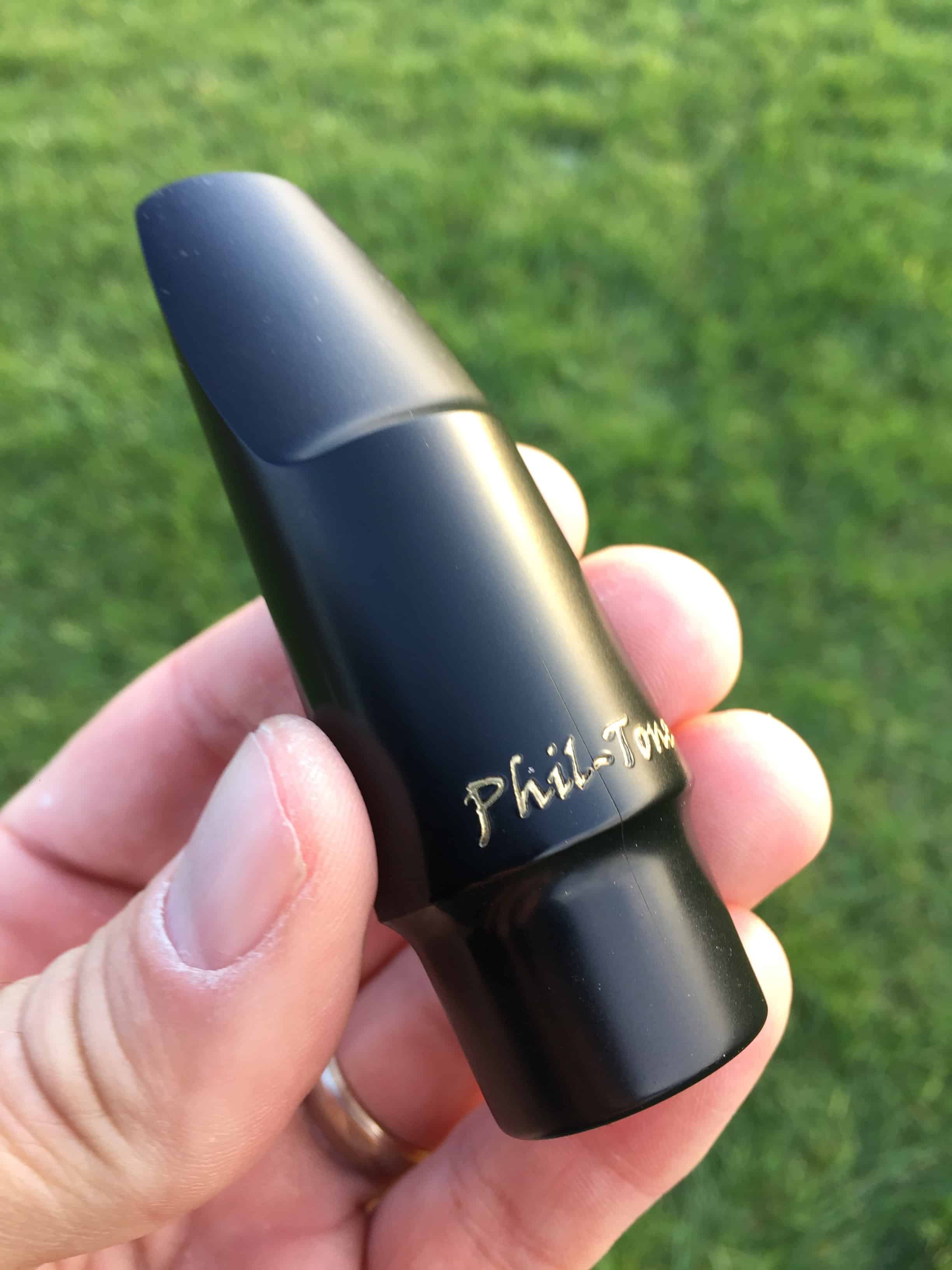

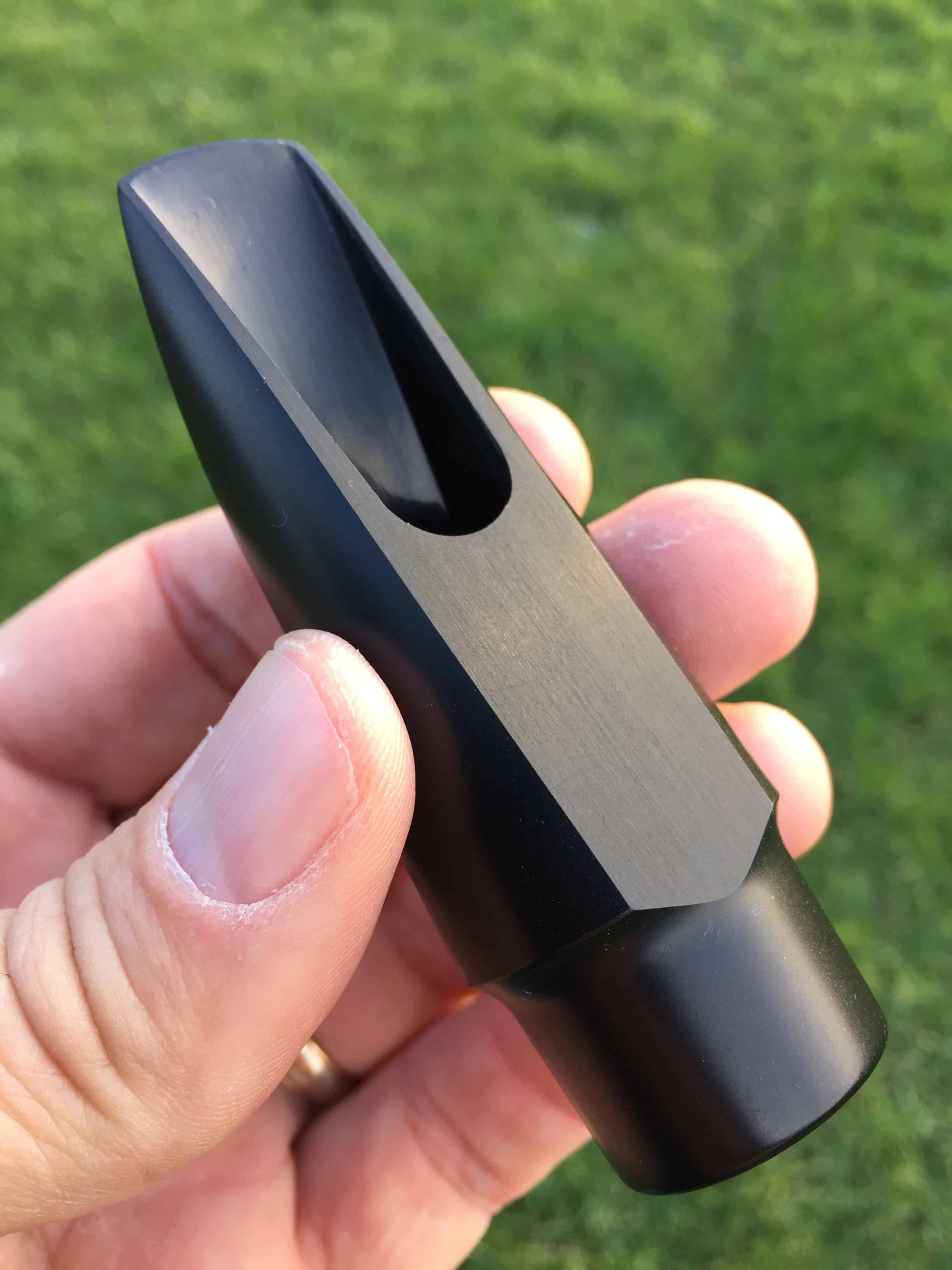


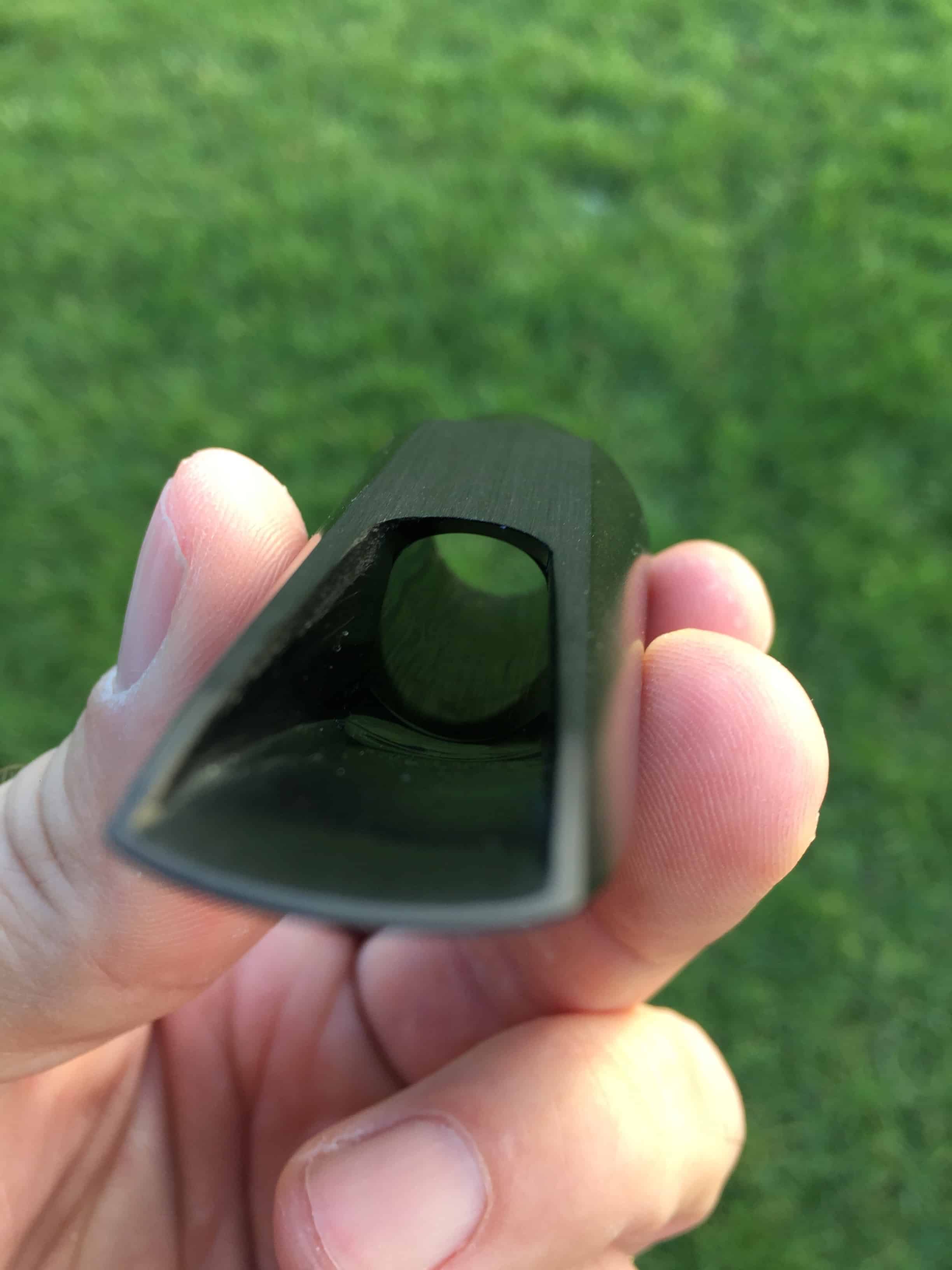
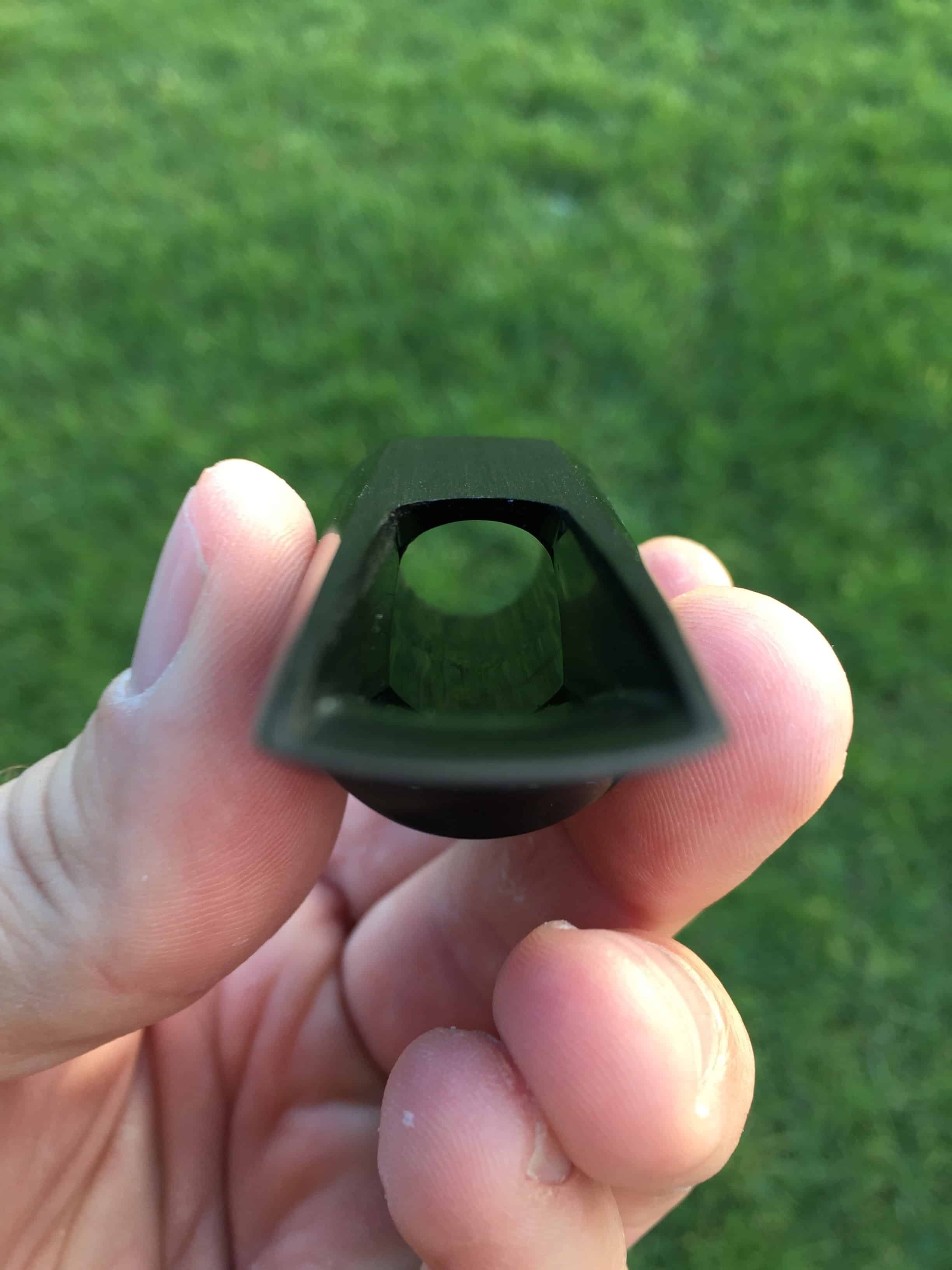

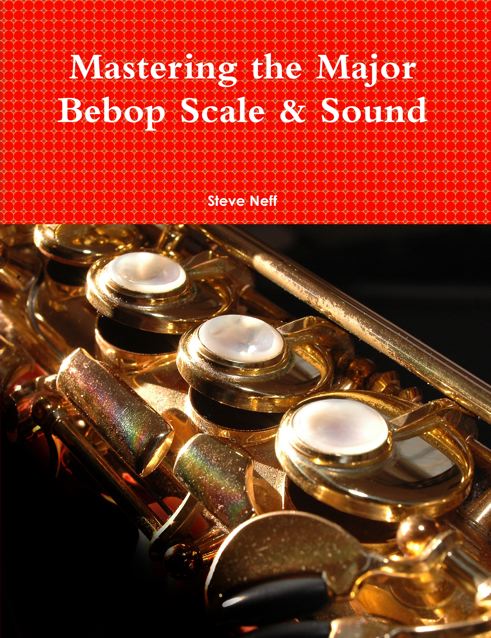


The Phil-Tone Orion mouthpiece sounds great Steve .
You get a nice crisp tone that has a singing quality . Thanks for the demonstration . Best wishes, Murray
I love my Orions (alto and tenor), and keep insinuating to Phil that I think a bari version would do well. They sound and play a little different than my stock Brilhart pieces, but it’s definitely in the same soundscape. Great pieces. I hope you get to try the tenor version!
Rick, Working on the Phil-Tone Orion tenor mouthpiece review right now! Should be out soon! Steve
Good mouthpiece!
It seems to me that, in my modesta opinion, in playing it, you were more in the mood of cool jazz and, every now and then, 1:59 of the sound clips, Bird …
Could it be a bit similar to the Gregory mouthpiece sound, isn’t it?
Giuseppe.
But I can’t know if a resin mouthpiece could sound like a “Freddy Gregory” mouthpiece or if you, Steve, “thinking” of Paul Desmond, automatically, regardless of the mouthpiece used, “can reproduce”, instinctively, respectively, the cool or bop sound related to Desmond or Bird …
Giuseppe.
Giuseppe,
A resin mouthpiece does not in of itself sound like a “Freddie Gregory” mouthpiece, Paul Desmond or Bird. The mouthpiece is a tool that the player uses to sound a certain way. There is a certain amount of the sound and phrasing that is due to my study and years of playing but it is also true that there are clips on this site that I do not sound like Desmond or Bird at all.
I believe the mouthpiece matters in that regard. Saying it doesn’t is like saying Tiger Woods could play an amazing golf game with a baseball bat as he would with his normal clubs. That is simply not true. What you are hearing in these clips is a combination of my knowledge and learning combined with the tool (mouthpiece) I am using. You need both! If you have rarely listened to Paul Desmond or Charlie Parker, and if you have never studied their lines or tried to imitate them to some degree, then a mouthpiece by itself will not help you. BUT if you have done some work in advance to sound like a certain player, then the tool you use can be incredibly important and useful! Steve
A few years ago, Phil refaced a Brilhart Ebolin for me. I’ve owned a few of these mouthpieces, but Phil’s work just made that mouthpiece special. (I sold it. Foolish!) So I’m gonna get one of these for sure. It sounds great in the clips, but, then again, everything you play sounds great. It does strike me as a little more “brittle” than the Meyer-type pieces I’ve heard you play. However, I also hear more of the “pop” you refer to, so that’s a plus. I’m excited about this piece.
Steve, given that I did not want to “imply anything”, that I completely agree with you on what you write and that I think you have misunderstood what I wrote, I answer between the lines “completing”, however, my thoughts, to your answer, which I report in quotation marks:
“A resin mouthpiece does not in of itself sound like a” Freddie Gregory “mouthpiece, Paul Desmond or Bird. The mouthpiece is a tool that the player uses to sound a certain way. There is a certain amount of the sound and phrasing that is due to my study and years of playing but it is also true that there are clips on this site that I do not sound like Desmond or Bird at all. ”
I agree, for having experienced it personally by studying, with what you write. Could I add that, perhaps, playing in other clips, you are thinking of other musicians?
“I believe the mouthpiece matters in that regard. Saying it doesn’t is like saying Tiger Woods could play an amazing golf game with a baseball bat as he would with his normal clubs. That is simply not true. What you are hearing in these clips is a combination of my knowledge and learning combined with the tool (mouthpiece) I am using. You need both! ”
I agree, to have also experienced it in practice, studying and, it was not what I wanted to imply with my comment as I have the impression you have imagined, but, I add, simply because I have experienced it, in my small way, also I personally who, if I want, as far as I’m concerned, with “any” decent mouthpiece, if I want, I can get the sound of the musician I’m thinking about; naturally within the due limits of my modest possibilities, not comparable with yours, but I am not a visionary. But I repeat that this was not what I meant by my comment, as I have the impression you have imagined.
“If you have rarely listened to Paul Desmond or Charlie Parker,”
Not “rarely”, but for decades, and hours, I have mostly listened to my many, a lot, records of Charlie Parker and much less, but enough, of Paul Desmond.
“and if you have never studied their lines or tried to imitate them to some degree, then a mouthpiece by itself will not help you.”
For years, in the past, until I chose the tenor, I played behind Charlie Parker’s records “by ear” (scolded, for this by my teacher at the time) and, I must say that, and it wasn’t just only me saying that, with various and different mouthpieces, the sound and phrasing were very similar to that of Bird. I also add that Bird himself, even using different mouthpieces, always had the Bird sound, perhaps different but the same. I repeat that I am not a visionary. But I repeat that this was not what I meant by my comment, as I have the impression you have imagined.
“BUT if you have done some work in advance to sound like a certain player, then the tool you use can be incredibly important and useful! Steve”
I do not question it and I did not want to question it, as I think you have misunderstood, not even before.
I wrote the second e-mail only to stimulate an answer, not necessarily due, which did not come, to my simple question: Could it be a bit similar to the Gregory mouthpiece sound, isn’t it?
Given that I admire and respect you, and I hope that my poor knowledge of English does not create other misunderstandings, allow me to be direct and sincere, because I have many faults but not the one of being insincere or of “underlining” to say something (I say it clearly and expressly), and to risk making a mistake:
isn’t it that you don’t like me and that you are a little prejudiced towards me?
Giuseppe.
Giuseppe, I was simply trying to respond the best I could to your comment:
My answer is just not for you but for the thousands of other people that might read these comments in the future. I am not sure why you think I am mad, or don’t like you? I read my comment over a number of times and I don’t see anything in it that would imply those feelings that I can see. I was just writing about the balance between the use of a mouthpiece and the skill and imagination of the player using it. Again, my comment isn’t just to you but to any player who reads these comments in the future. Steve
As I reread your post, I think the issue is that you seem to be taking my comment personally. When I make comments like:
I am speaking in general terms about every and any player in the world. You responded to each comment I made as if I was commenting about you and for example, that you did not listen to Charlie Parker or Paul Desmond personally. Obviously, I was not talking about you because we do not know each other personally and I don’t know who you have listened to and what your history is. I hope this makes sense. Steve
The impression was given by a contributing cause of things.
The question was simple: “Could it be a bit similar to the Gregory mouthpiece sound, isn’t it?”. The answer might have been: no, I don’t think so; or: yes, a little bit; or: no, it depends on how I play it; or: it depends on how you, or others, play it.
Instead you started giving a lesson that seemed destined to the incapable student, on obvious arguments and that every saxophonist who has not started playing “tomorrow” does not know, saying that it depends on the study, on the skill of the player and, then, apparently contradicting you, however, by the mouthpiece, with the example of the golf club and baseball … (I hate golf, because if played where it does not rain every day, as in Ireland, thousands of liters of water are wasted to entertain rich gentlemen, while in the world people are dying of thirst).
It was therefore easier, after the example of the golf and baseball bat, to answer whether the mouthpiece in question resembles a little or not to a Gregory: to the answer “no”, I would not have been offended for having had the wrong impression; I wasn’t I playing the mouthpiece, after all … question you still haven’t answered, despite the detailed description of the mouthpiece in the review.
You tell me that the answer was in general for others who read and not addressed to me; but “I” had asked the question in the first place and, therefore, you could answer “also” to me, rather than to anyone since, perhaps, my question had intrigued someone else who read like me.
I also got the impression because, for some time now, unlike from what happens with others, to whom you answer “in particular”, any question I ask there is a reason why you cannot “answer” and it seems incredibles that I guess all the impossible questions, and that, apart from me, cannot interest other readers.
So maybe I’m crazy … and I’ve never played the saxophone, never listened to a Bird or Trane or Dex record …
(… “If you have rarely listened to Paul Desmond or Charlie Parker, and if you have never studied their lines or tried to imitate them to some degree, then a mouthpiece by itself will not help you … ” )
and I enjoy writing on your blog and asking stupid questions to which I don’t get answered but only others who will read besides me; indeed, evidently, not even them.
You guessed right, reading it again, it seemed that, instead of speaking in general to many who don’t listen to records, don’t study, don’t know how to play, “… in some degree …”, the mouthpiece they use certainly can’t help them: indeed; we all know this; but then it is useless to illustrate the qualities of this or that mouthpiece, in that case …
If you spoke in general because you write, capitalized: “… BUT if you have done some work in advance to sound like a certain player, then the tool you use can be incredibly important and useful!”
If you … not, at least, “if one” …
And, then, the tune, the mouthpiece, is it important or not? If you don’t study any mouthpiece is useless, if you study you play well with everything, as you demonstrate, even better if with a good mouthpiece; but what is the “good mouthpiece”? The one about which, when you do a review, someone, in this case me, asks you a question, since you are playing it and not me and, therefore, the real feeling of how it sounds is a little different from how you feel it, “physically”, as I “listen” to it passively.
Hence the question … With an educational answer for all present and future readers, except for me who did it.
In fact, you specify:
“… I am speaking in general terms about every and any player in the world. You responded to each comment I made as if I was commenting about you and for example, that you did not listen to Charlie Parker or Paul Desmond personally. Obviously, I was not talking about you because we do not know each other personally and I don’t know who you have listened to and what your history is. I hope this makes sense. Steve “.
Precisely because you do not know the story of each of us, perhaps, it would be good to avoid paternalistic and, slightly, offensive phrases, as if you were talking to the last of the incapable saxophonists … refer to others in general.
Unless you make it clear that you will only answer questions that, at your sole discretion, you believe are of general interest.
Well, you know, when I read at the end of a review something like “let me know what you think, etc.” I thought you were interested in the opinion of “each” person and the reasons why that person has that opinion.
However, if you express an opinion and ask a question, the question is answered “without” answering but “if the teacher puts the person who has done it in punishment behind the blackboard because, obviously, his question is stupid and there is no answer because interested “only him and not all the others in general,” you have the opinion but who asked the question remains behind the blackboard, laughingstock of the whole class!
Partially summarizing, Steve, you write to me: “As I reread your post, I think the issue is that you seem to be taking my comment personally …”;
but sorry, who were you answering? I was thinking of myself … of course I take it “personally”!
In Rome, answering as you do is called “arrampicarsi sugli specchi”, “climbing on mirrors”!
Sorry, for giving a “lesson” when you were looking for a specific answer. I had good intentions but it seems my response did not come across well to you. I deeply apologize if I have insulted you.
I can try to answer your question specifically but I do not know what “Gregory” you are asking me to compare it to? Are you asking about some of the Freddie Gregory refaced alto mouthpieces I have reviewed here on my site in the past? If so, each one is unique and different because they are different brands and models of mouthpieces that he had refaced. Or are you asking about Freddie Gregory’s brand of alto mouthpieces that are very rare and that I haven’t reviewed on my site that I can remember. I can’t speak about those because I don’t think I have played one. Or are you asking about MC Gregory alto mouthpieces like Paul Desmond played? I can’t write about those either because I haven’t tried one of those so far in my life. Sorry for not being able to answer the question with a simple yes or no. I do hope I get a chance to try a MC Gregory alto mouthpiece sometime in the future though because I am curious about them…….. Steve
“Sorry, for giving a “lesson” when you were looking for a specific answer. I had good intentions but it seems my response did not come across well to you. I deeply apologize if I have insulted you.”
I do not consider myself insulted, since I do not recognize myself in the eventual “accusations”.
Did you have good intentions and did the answer come out wrong.
The answer you gave with this comment about your knowledge of the Gregory would have been right.
Excuses do not interest me, I would just be happy to understand if there really was a misunderstanding or not both in your understanding my first question and in my perceiving your answer: I give enormous value and respect to people, to myself, and also to what they think of me; and I consider this a compliment.
I cannot know by heart which models you have tried of the Gregory and which ones you are aware of.
However, I was referring to the Gregory Model A played by Desmond A4A18 (medium chamber 18, tip opening 4).
The model B, however little appreciated, I read that had the chamber similar to the Brilhart. Read here:
https://theowanne.com/knowledge/mouthpiece-museum/mc_gregory-mouthpieces/
I’m sorry if I answered you angry, regardless of everything.
Giuseppe.
I forgot: I too am sorry for what happened and I also deeply apologize if I misunderstood and offended you.
Giuseppe.
No problem at all. We are all good! Steve
Good…
Giuseppe.
It doesn’t look like it, there’s probably some kind of mistake. I can’t hear Charlie Parker. It’s not Brilhart.
On my Orion, with Fibracell reeds on my 875EX I get a ton of Charlie Parker. I will say that the Orion is a little brighter and more free-blowing than my stock Brilharts for both alto and tenor, but it’s definitely within the Brilhart soundscape. They’re great pieces!
Sorry Alexander, I am only now reading your comment and trying to answer you; given that I, personally, regardless of which of the many mouthpieces Bird played, and not just Brilhart, can still recognize it, my QUESTION to Steve was:
“Good mouthpiece!
It seems to me that, in my modest opinion, in playing it, you were more in the mood of cool jazz and, every now and then, on 1:59 of the sound clips, Bird…
Could it be a bit similar to the Gregory mouthpiece sound, isn’t it?
Giuseppe. “.
Are there any mistakes? Perhaps in reading my comment too hastily? Because mine was partially a “question”, not an “assertion”, as I think, perhaps, you have interpreted it; if you read the question completely you will realize that I say, and now I repeat (it’s my idea: I can be wrong, Steve can be wrong (sorry Steve LOL), you can be wrong and anyone else can be wrong, maybe even a revived Bird; Who can say? Who can tell? Judge it? This World is a democratic country, then everyone takes responsibility for the more or less obvious nonsense he says, starting with me!).
I say that, in the two strings, ON 1:59 OF THE SOUND CLIPS, as Steve plays it, the mouthpiece, or rather Steve, remembers Bird … And I wrote more … not just this.
In my other comment, where I report the link taken from Theo Wanne’s Mouthpiece Museum:
https://theowanne.com/knowledge/mouthpiece-museum/mc_gregory-mouthpieces/
however, I read that: “… 1936-1947: Gregory Model B Made from the same great hard rubber as the Model A but with flat inner side walls. The chambers are a lot like a Brilhart Ebolin or Tonalin … “.
From this arose my other question, generic.
In fact the mouthpiece is not a Brilhart but a Phil Tone Orion; if you read the review and look at the photo of Bird in the review, it can give some impressions …
Steve writes, referring to Phil Engleman: “… A couple of months ago he announced that he had a new mouthpiece model called the Orion model that was based off of the old Brilhart Tonalin alto saxophone mouthpieces …”.
And Steve, also, reports what Phil declares: “… The Orion is based on the old Brilly pieces … think Charlie Parker. ..”.
But, of course, I repeat: “in the two strings, ON 1:59 OF THE SOUND CLIPS, as Steve plays it, the mouthpiece, or rather Steve, remembers Bird … And I wrote more … not just this”.
I also repeat that: “it’s my idea: I can make a mistake, Steve can make a mistake (sorry Steve LOL), you can make a mistake and anyone else can make a mistake, maybe even a revived Bird; who can say? Who can tell? Judge it? This World is a democratic country, then everyone takes responsibility for the more or less obvious nonsense he says, starting with me!”.
Thank you for answering me.
Giuseppe.
Clarification:
where I wrote “… it’s my idea: I can be wrong, Steve can be wrong (sorry Steve LOL), you can be wrong and anyone else can be wrong, maybe even a revived Bird; Who can say? Who can tell ? Judge it? This World is a democratic country, then everyone takes responsibility for the more or less obvious nonsense he says, starting with me! .. “,
I wanted, of course, to imply that everyone takes responsibility for the more or less obvious “EVENTUAL” nonsense he says, starting with me!
Yes, thanks for the answer, I’m looking for a good mouthpiece. In the end, I played on a Brilhart Carlsbad alto saxophone mouthpiece. On my Yamaha, the plastic rings too much, so I’m looking for something else. I don’t understand what manufacturers do. Make Brilhart (I’m looking for old mouthpieces) and good Beechler mouthpieces (need to kidnap Dave Koz). That would be enough. Old sound, that’s what everyone likes. Modern saxophones can’t sound normal. Modern mouthpieces are also a disappointment. Why is everyone trying to make a Meyer this so stupid. If the mouthpiece is positioned as inspired by Brilhart, then please play in the old manner. I listen to this sound and do not know what to say, how to apply it?
Yes, I’m too picky. But really, where to find a good alto mouthpiece? This is a big problem. There are other Brilhart’s on ebay, but they have been modified or small… Modern manufacturers make strange mouthpieces, how can you enjoy them? Where is the beautiful sound? Sorry, it’s more of a cry of the soul. Maybe the saxophone era is gone and I’m trying to find something in the cemetery))
P.s. Yes, I don’t like Meyer. Why everyone produces Meyer I do not know.
Alexander, The Phil-Tone Orion alto mouthpiece is nothing like a Meyer. The chamber and sidewalls are totally different than a Meyer. The sound is totally different than a Meyer in my opinion. I play many different things on the sound clip including some slower melodies. I start with “There is No Greater Love” a jazz classic from 1936. (When you say an old style do you want something before 1936?) At :46 I go into “The Summer Knows” melody from 1971. After that, I play a lot of my usual stuff I play on clips. I try to play a mix of things so that people can get an idea how the mouthpiece sounds in different genres. Steve
Hi Alexander,
I think the sound comes not only from the mouthpiece or sax, but also that “you” can give the sound to the mouthpiece:
I hope not to say a known banality.
Many of the famous saxophonists of the past were always recognizable despite often changing their mouthpieces: Bird, Sonny Rollins, Sonny Stitt …
Then it depends on your tastes and how you feel with a particular mouthpiece; for this I think it is necessary to try the mouthpieces for a while or, at least, try them once.
For me, listening to it played by other musicians, I really like the 10 M Fan Showboat – hear how Dave Pollack plays it old fashioned … – It’s among these audio clips: https://10mfan.com/alto-showboat -audio /
The mouthpieces Phil Tone Novella, Rift, Solstice, Le Son, Intrepid etc. they also offer a nice range of beautiful alto sax sounds; there are sound clips: https://phil-tone.com/alto-gallery
There is only the embarrassment of choice and personal taste.
Good research … and best wishes.
Giuseppe.
Not sure anyone will scroll down this far, but… I purchased the Orion 6 alto mp on the advice of a player whose sound I really admired. Although I was aware of the pitfalls in this approach, the relatively low price of the Orion made the risk acceptable (nothing ventured nothing gained). I had been playing on a Vandoren V16 A6, but felt it was too resistant when paired with 2.5 Java red reeds. The sound was a little husky down low, and sometimes shrill up top. In comparison, the Orion spoke very easily in the lower register, and timbre seemed more consistent over the range. Articulation was more fluid for me (reduced resistance?). But I think what I liked most was the resonance I heard (more overtones?), which to my ear improved the sound without becoming overly edgy or bright. I had trouble believing the sound was coming from my horn. Having finally found an easy playing, great sounding mouthpiece, I can now dedicate more time to technique and improv.